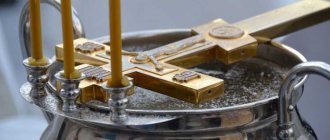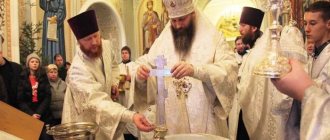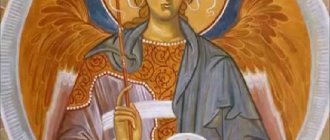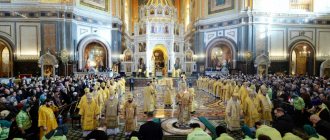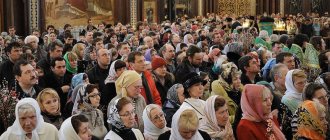Audio version of the article
See also: Menaea. January. Holy Epiphany. Baptism of the Lord God and our Savior Jesus Christ
On the Eve of Epiphany and the feast of the Epiphany itself, the Rite of Great Blessing of Water is performed in churches. For a better understanding of the service, we present to your attention a description of this Rite and some of the liturgical texts included in it.
The Church renews the memory of the Jordan event with a special rite of the great consecration of water. The priest, through the royal doors, while singing the troparia “The Voice of the Lord on the Waters...” comes out to the vessels filled with water, carrying the Honorable Cross on his head, and the consecration of the water begins.
The blessing of water also takes place on the holiday itself after the liturgy (also after the prayer behind the pulpit).
The Orthodox Church has been performing the great consecration of water on Vespers and on the holiday itself since ancient times, and the grace of consecrating water on these two days is always the same. At the Forever, the consecration of water was performed in remembrance of the Baptism of the Lord, which sanctified the watery nature, as well as the baptism of the catechumens, which in ancient times was performed at the Forever of Epiphany (Lent. Apost., book 5, chapter 13; historians: Theodoret, Nicephorus Callistus). On the holiday itself, the consecration of water occurs in memory of the actual event of the Baptism of the Savior.
The sequence of the great consecration of water both at Vespers and on the holiday itself is the same and in some parts is similar to the sequence of the small consecration of water. It consists of remembering the prophecies relating to the event of Baptism (parimia), the event itself (the Apostle and the Gospel) and its meaning (litany and prayers), invoking the blessing of God on the waters and immersing the Life-giving Cross of the Lord in them three times.
In practice, the rite of water blessing is performed as follows. After the prayer behind the pulpit (at the end of the liturgy) or the litany of petition: “Let us perform the evening prayer” (at the end of Vespers), the rector in full vestments (as during the liturgy), and the other priests only in the stole, shoulder straps and phelonion, go through the royal doors to the sacred fonts in the vestibule or at the source.
Priests with candles walk ahead, followed by singers singing the troparion Voice of the Lord, deacons
The voice of the Lord cries out on the waters, saying: come, receive, all of you, the Spirit of wisdom, the Spirit of understanding, the Spirit of the fear of God, who has appeared Christ. [Thrice.]
Today the waters are sanctified by nature, and the Jordan is divided, and its streams return to the Master of the baptized in vain. [Twice.]
As Man came to the river, O Christ the King, and sought to receive servile baptism, O Blessed One, from the hand of the Forerunner, a sin for our sake, Lover of mankind. [Twice.]
Glory, and now, the same voice.
To the voice of him crying in the wilderness, prepare the way of the Lord. You came, Lord, taking on the form of a slave, asking for baptism, not knowing sin: you saw the water and were afraid. The Forerunner was trembling and cried out, saying: How will the lamp of Light illuminate? What hand will a slave lay on the Master? Sanctify the waters for me, O Savior, take away the sin of the world.
At the site of the blessing of water, the Cross is placed on a decorated table, on which there should be a bowl of water and three candles. During the singing of troparions, the rector and the deacon cense the water prepared for consecration (around the table three times), and if the water is consecrated in the church, then the altar, clergy, singers and people also cense.
At the end of the singing of the troparions, the deacon proclaims: Wisdom, and three proverbs are read ( from the book of the prophet Isaiah), which depict the gracious fruits of the Lord’s coming to earth and the spiritual joy of all who turn to the Lord and partake of the life-giving sources of salvation.
Events of Epiphany
These events took place on the Jordan River approximately 2000 years ago.
At that time, John the Baptist preached and baptized there. Many Jews went to him to be baptized - this is how they thought they would be cleansed of their sins. But John the Baptist did not “cleanse” everyone: he reminded that before washing one must confess one’s sins - repent, only then will the sins be “washed away.” But then Christ comes to the Jordan. John is at first hesitant to baptize Christ, but then he obeys.
As soon as Christ descended into the Jordan, John saw the Spirit of God, who in the form of a dove descended on Christ, and from heaven he heard the voice of God the Father: “This is My beloved Son, in whom I am well pleased.”
Why was the sinless Christ baptized?
Both sinners and Christ were immersed in the Jordan. But for the former it was a baptism of repentance, and forgiveness was expressed in washing. People went to the Jordan to wash away their sins.
Christ entered the Jordan to take upon himself all the consequences of man's sins, along with the suffering and pain that sins bring. Accept until death on the Cross, but - ultimately - to defeat sin and death.
And the first action took place as soon as Christ emerged from the waters of the Jordan: the waters were sanctified. Sanctification, the transformation of water - a created element - became the guarantee and beginning of the future transformation of all creation, and most importantly - of man, his birth in the spirit, from earthly, material, finite life - into eternal life. Man receives this pledge of eternal life in Holy Baptism as a gift that is called upon to be revealed.
The meaning of the holiday
Miniature Minology of Vasily II.
Constantinople. 985 Vatican Library. Rome. Photo from the site bizlida.by There are two main events that we celebrate in Epiphany: the Baptism of Jesus Christ, who took upon himself the sins of people, and the revelation of the hitherto unknown mystery about the One God in three Persons - the Holy Trinity - to many people. God the Father spoke from Heaven, testifying that Christ is His Son, the Son of God was baptized in the waters of the Jordan, and the Holy Spirit descended on Christ in the form of a dove.
Therefore, the day of the Baptism of the Lord is also called Epiphany. And therefore, when receiving holy Baptism, a person is baptized in the name of the Father, and the Son, and the Holy Spirit.
Prayer^
Great art thou, O Lord, and wonderful are thy works, and not a single word will be sufficient for the singing of thy wonders. [Thrice.]
You brought all things into being by the will of those who do not exist, by Your power you support creation and by Your providence you build the world. You are a creature created from the four elements, you crowned the circle of summer with four times. All intelligent powers tremble to you: the sun sings to you, the moon praises you, the stars are present to you: the light listens to you, the abysses tremble to you, the springs work for you. You have stretched out the sky like a skin: You have established the earth on the waters: You have protected the sea with sand: You have shed air for rest. The angelic forces serve You, the faces of the Archangels bow to You: the many-eyed cherubs and the six-winged seraphim, standing around and flying around, are covered with the fear of Your unapproachable glory. For You are the Indescribable God, the Beginningless and the Unspeakable, You came to earth, taking on the form of a servant, becoming in the likeness of humanity: You did not, O Master, endure mercy for the sake of Your mercy, to see the human race tormented by the devil, but You came and saved us. We confess grace, we preach mercy, we do not hide good deeds: you have freed the nature of our race. Thou hast sanctified the virgin womb with Thy Nativity: all creation glorifies Thy appearance. You, our God, appeared on earth, and you lived with men: You sanctified the streams of the Jordan, You sent down Your Holy Spirit from heaven, and You crushed the heads of the serpents nesting there.
And the priest said this three times, and blessed the water with his hand for each verse:
You, O Lover of Mankind, come now through the influx of Your Holy Spirit and sanctify this water. [Thrice.]
And give her the grace of deliverance, the blessing of the Jordan: Create with it the source of incorruption, the gift of sanctification, the resolution of sins, the healing of ailments, the destruction of demons, impregnable to resisting forces, filled with angelic strength: May all who draw and partake of it have it for the purification of souls and bodies, for healing a fair amount of passion for the consecration of houses, and for all benefits. For You are our God, Who through water and the Spirit renewed our nature, which had been promised by sin: You are our God, Who drowned Noah’s sin with water. You are our God, who by the sea freed the Jewish race from the work of Pharaoh Moses. For You are our God, breaking down the stone in the desert, and flowing waters, and flooding streams, and satisfying Your thirsty people. You are our God, Who changed Israel from water and fire to Elijah from the deception of Baal.
Even now, Master, sanctify this water with Your Holy Spirit. [Thrice.]
Grant to all who touch it, and who partake, and who are anointed with it, sanctification, health, purification and blessing.
Lord save and have mercy on our great lord and father, His Holiness the Patriarch (name), and our lord, the Most Reverend Bishop [name], and keep them under Your roof in peace, subdue every enemy and adversary to them. Grant to them all the petitions for salvation, and eternal life: that through the elements, and men, and angels, both visible and invisible, glorify Your most holy name, with the Father and the Holy Spirit, now and ever, and unto the ages of ages, amen .
Priest: Peace to all.
Deacon: Bow your heads to the Lord.
The priest bows down and prays secretly:
O Lord, incline Thy ear, and hear us, Who deigned to be baptized in the Jordan, and who sanctified the waters, bless all of us, who with the inclination of our necks signify the working imagination: and grant us to be filled with Thy sanctification by partaking of this water, and may it be unto us, Lord, in health of soul and body.
Proclamation: For Thou art our sanctification, and to Thee we send up glory and thanksgiving and worship, with Thy Eternal Father, and Thy Most Holy, and Good, and Life-giving Spirit, now and ever, and unto ages of ages, Amen.
When does the blessing of water take place?
In churches, the great consecration of water takes place on Epiphany Eve - on the morning of January 18, and on the feast of Epiphany itself - on the morning of January 19.
The water-blessing holiday prayer service on both January 18 and 19 begins immediately after the Liturgy (in the morning) - in a church or on the street, on a reservoir near a specially constructed ice hole, which is called the “Jordan”.
During the procession to the place of consecration, incense is performed and special troparia are sung, revealing the meaning of the Baptism of Christ and the connection between this event and the consecration of water.
Prayers for the consecration of water speak of giving it various grace-filled gifts, as well as help and enlightenment of those who collect it for drinking, sprinkling, and consecrating houses.
Water blessed on January 18, Epiphany Eve, and January 19, the feast of Epiphany itself, has exactly the same properties and power.
The great consecration of water takes place only twice a year - on January 18 and 19 - on the eve of and on the feast of Epiphany itself. It should not be confused with the minor consecration of water at water-blessing prayers, which are served throughout the year on certain days, as well as at the request of believers.
***
During those decades when church life in our country was virtually banned, various prejudices and superstitions associated with the meaning of holy water became widespread among the people, and simple ignorance of the Sacraments can sometimes lead to a dead end. Evidence of this is the large number of questions we receive on the diocesan website www.eparhia-saratov.ru. Let's try to answer at least some of them.
— Why is water blessed on both January 18 and 19?
- On both days, the same rite of the Great Blessing of Water is performed. All the prayers that are read are absolutely the same. The custom of blessing water twice appeared in ancient times. Then the Sacrament of Baptism was preceded by a long training of those wishing to be baptized in the basics of Orthodox doctrine and was performed only a few times a year, and most baptisms occurred on the day of Epiphany. In order to have time to baptize everyone without sacrificing the beauty and solemnity of the ceremony, they began to set aside two days for this. Therefore, in order to avoid excessive crowds of people in churches on the day of Epiphany, you can come to the temple for holy water on both the previous and subsequent days.
— Is the water consecrated on the day of Epiphany and on Epiphany Christmas Eve different in its properties?
- No. Both on Christmas Eve and on the day of the holiday itself, the water is blessed in the same way. You need to understand that water becomes holy after church prayer, and not because January 19 has arrived.
— Is it true that swimming in an ice hole at Epiphany washes away all sins from a person?
- Of course, this is not so! Swimming in an ice hole is an old pious tradition, but it is not a church sacrament. Initially, this was the norm of church piety: to plunge into the ice hole three times, imitating the baptism of Christ. Today this can be explained this way: when preparing for the holiday, we cleanse ourselves spiritually, and washing in an ice hole is also a bodily cleansing, just as the morning prayer rule serves spiritual cleansing, and eating holy water and prosphora on an empty stomach serves to sanctify our bodily nature. And remission of sins is possible only during confession in church, in the Sacrament of Repentance.
— When does the water in a polynya lose its quality of sanctification?
— Gifts given to water are given through prayers included in the Rite of the Great Blessing of Water. Thus, we can assume that the water in the reservoir retains its properties throughout the entire holiday, that is, until January 20.
— There is an opinion that on Epiphany all the water on the planet becomes Epiphany, even from the tap. Is it so?
— If we think broadly, then, of course, we can say that all water is sanctified. But at the same time, it must be very clearly understood that water is not sanctified by itself, but thanks to the fact that there is a Church. It is important to understand that the blessing of water is not a magical act. Grace does not work mechanically, but according to the faith of a Christian. Therefore, a Christian should participate in church prayer and take water from the church. If he, citing the fact that all the water on the feast of Epiphany is holy, is lazy to go to church, neglects the Rite of Consecration, thus he neglects Divine grace and sins before the Lord. But if a person does not have the physical opportunity to visit the temple (he is sick, the temple is extremely far away, other objective circumstances), he can get water from the nearest body of water or even from a tap (and the water will have the same properties), but this must be done with faith and prayer. In the history of the Church one can find many examples of the Lord’s help given through the prayers of Christians through water not blessed by church rites.
— Is it correct to believe that holy water blessed on other holidays is less blessed?
— Such a comparison is incorrect. The Divine power of shrines cannot be compared. In church practice, there are two types of water blessing: small and great. Small things are done repeatedly throughout the year (on the following holidays: the Origin of the Trees of the Honest and Life-Giving Cross, Mid-Pentecost, on Friday of Bright Week in honor of the icon of the Mother of God “Life-Giving Source”, on church holidays, as a private service at the request of parishioners). The great thing is only on the feast of the Epiphany. The name itself emphasizes the special solemnity of the ceremony. But the small and great consecration differ not only in the timing, but also in the prayer requests. During the Great Consecration, special petitions are offered, we pray for salvation, the Great Hagiasma is blessed to be drunk not only on an empty stomach, but all day long, everything is sanctified with this water, and during the Lesser Hagiasma, petitions are aimed at satisfying everyday needs (for healing bodily ailments, for spiritual fortifications, etc.). Therefore, in this case we are talking about the various gifts of Grace.
— What to do with the Epiphany water left over from last year? Does it retain its properties?
- Water consecrated on the feast of the Epiphany or on the eve of it can be used for any time, and not necessarily only until the next holiday. If stored carefully, it will not deteriorate. If it seems to you that Epiphany water is no longer suitable for consumption, you can pour it out, but in no case where we pour out all the waste. For this purpose, there are dry wells at temples. You can also pour it into running water (open water).
— Does it happen that holy water doesn’t help?
— Saint Theophan the Recluse writes: “All grace coming from God through the Holy Cross, holy icons, holy water, relics, consecrated bread (artos, antidor, prosphora), etc., including the Most Holy Communion of the Body and Blood of Christ, has power only for those who are worthy of this grace through prayers of repentance, repentance, humility, service to people, works of mercy and the manifestation of other Christian virtues. But if they are not there, then this grace will not save, it does not act automatically, like a talisman, and is useless for the wicked and imaginary Christians (without virtues).” Thus, holy water will help a Christian who truly believes in the power of Divine grace. In this case, miracles of healing are possible. If a person acts out of curiosity, “just in case,” without repenting of his sins, then there is no need to wait for help.
Is all the water on earth on the night of January 18-19 holy?
The rite of the great consecration of water on Epiphany Eve in the Transfiguration Church of the Cathedral of Christ the Savior.
Moscow, Russia. Photo: Mikhail Tereshchenko/TASS On the night of January 18-19, all earthly waters reveal the presence of God’s grace.
However, the belief that all water is sanctified on the night of Epiphany does not equate all water with the water that is sanctified in the temple. The blessing of water on Epiphany night is a one-time manifestation of God's grace. Epiphany water consecrated in the church does not lose its power over time. The fact that on this day all water is sanctified does not diminish or cancel the sacrament of the consecration of water in the temple.
Is it possible to get Epiphany water from the tap?
Modern people prefer to use tap water. This is a great benefit of civilization. But many are interested in whether it is possible to recruit it for consecration. There are no prohibitions on this matter. If you need to swim on Epiphany, you don’t have to freeze in an ice hole. You can just take a shower. Tap water on this day is also endowed with healing properties. But she cannot be called a saint.
It is important to understand that for certain purposes, water must be blessed. You can come to church and collect some liquid in your own container right in the church. Many people bring their own water or even read prayers over it themselves. Tap water is also suitable for these purposes. But it must be clean, not rusty, colorless, odorless. Do not collect liquid of questionable quality.
On a note!
Many people collect water on January 18, defend it, and on the 19th they go to bless it in the church.
How does simple water become holy?
Water is sanctified not because a cross is immersed in it and it acquires “silver ions,” as was written in anti-religious Soviet brochures. Water is sanctified because Christ once sanctified it in His baptism, and in answer to the prayers of the Church continues to do so by sending the Holy Spirit. Water becomes holy because, through the prayer of the Church, God’s grace is united with it.
The priest is given the power to ask, through special prayers and sacred rites, for the sending down of God’s grace-filled gifts onto the waters. The prayers for the consecration of water say: “Let us pray to the Lord for this water to be sanctified by the power and action and influx of the Holy Spirit.” The Holy Spirit enters ordinary water and makes it extraordinary, makes it holy, which, in turn, imparts grace to everything that comes into contact with it. First, the priest sanctifies ordinary water, reading prayers over it and immersing the cross in it. And then this water itself imparts grace to what the priest sprinkles with it.
Three proverbs^
Audio
Isaiah's prophecies reading: (Is.35)
Thus says the Lord: let the thirsty desert rejoice, let the desert rejoice, and flourish like a tree, and let it vegetate, and let everyone rejoice. And the desert Jordan will rejoice, and the glory of Lebanon will be given to it, and the honor of Carmel, and My people will see the glory of the Lord and the height of God. Strengthen your weak hands, and comfort your weak knees. And cry out to the faint-hearted, be strong and do not be afraid: behold, our God rewards judgment, He will come and save us. Then the eyes of the blind will be opened, and the ears of the deaf will be heard: Then the lame will leap like a tree, and the tongue of the deaf will be clear: as water has burst forth in the desert, and the wilds in a thirsty land. And there will be a waterless land in the blata, and in the thirsty land there will be a source of water: there will be the joy of the birds, the installation of sirens, and reeds, and blata. There the path will be pure, and the path will be called holy; and the unclean one will not pass by; below there will be the unclean path; but those who are scattered will walk along it and will not go astray. And there will be no lion there, lower than the fierce beasts the nan will rise, lower there will be found there: but they will follow it, delivered and gathered from the Lord. And they will be converted and come to Zion with gladness and joy, and everlasting joy will be upon their heads. Praise and joy and joy will befall them; sickness, sorrow and sighing will escape.
Isaiah's prophecies reading: (Is.55)
This is what the Lord says: if you are thirsty, go to the water, and do not have any money, but go and buy and eat and drink, without money or price, wine and fat. How much do you value silver, not for bread, and your labor not for satiety? Listen to Me, and you will receive good things, and your soul will delight in good things. Give ear to your ears and follow My path: you will hear Me, and your soul will live in good things. And I bequeath to you an everlasting covenant, faithful Saint of David. This is a testimony among the nations, His prince and ruler among the nations. Behold, the pagans who do not know you will call on you, and the people who do not know you will run to you for the sake of your Lord and the Holy One of Israel, for they have glorified you. Seek God, and when you find Him, call upon him. Whenever it comes near to you, let the wicked forsake his ways, and the wicked man his counsel: and turn to the Lord your God, and you will have mercy, for your sins will be forgiven in abundance. For My counsels are not as your counsels are: lower than your ways are My ways, saith the Lord. But just as the heavens are separated from the earth, so is My way separated from your ways, and your thoughts from My thoughts. For if rain or snow falls from heaven, and does not return from there, it will make the earth drunken, and give birth and vegetate, and give seed to the sower, and bread for food: So shall my word be, if he go out of my mouth, and shall not return? I will come to Me, until all I have desired, and I will hasten My ways and My commandments. For you will go forth with joy, and you will learn with joy: the mountains and hills will rush over waiting for you in joy, and all the trees of the village will be entwined with branches. And instead of dracia, a cypress will come up, and instead of a crop, myrrh will come up. And the Lord will be for a name and for an everlasting sign, and will not fail.
Isaiah's prophecies reading: (Is.12:3-6)
This is what the Lord says: Draw water with joy from the fountain of salvation. And he said on the day: Confess to the Lord, and call on His name, proclaim His glory to the nations: remember how His name is exalted. Sing the name of the Lord, as you have done: proclaim this throughout all the earth. Rejoice and be glad, you who live in Zion, for the Holy One of Israel has been exalted in the midst of it.
Then the prokeimenon , Lord my enlightenment, is sung, the Apostle and the Gospel are read.
The Apostolic Reading (beginning 143: 1 Cor. 10:1-4) speaks of the mysterious baptism of the Jews into Moses among the clouds and the sea, of their spiritual food in the desert and drinking from the spiritual stone, which was Christ.
I do not want to leave you, brethren, ignorant, that our fathers were all under the cloud, and all passed through the sea; and all were baptized into Moses in the cloud and in the sea; and they all ate the same spiritual food; and they all drank the same spiritual drink: for they drank from the spiritual following stone; the stone was Christ.
The Gospel (2nd chapter
And it came to pass in those days that Jesus came from Nazareth of Galilee and was baptized by John in the Jordan. And as he came up from the water, immediately John saw the heavens opening and the Spirit like a dove descending on Him. And a voice came from heaven: You are My beloved Son, in whom I am well pleased.
After reading the Holy Scriptures, the deacon pronounces the great litany with special petitions. They contain prayers for the sanctification of water by the power and action of the Holy Trinity, for sending down the blessing of the Jordan on the water and giving it grace for the healing of mental and physical infirmities, for driving away all slander of visible and invisible enemies, for the sanctification of houses and for all benefits.
During the litany, the rector secretly reads a prayer for the purification and sanctification of himself: Lord Jesus Christ... (without exclamation). At the end of the litany, the priest (rector) loudly reads the consecration prayer: Great art thou, O Lord, and wonderful are thy works... and so on. In this prayer, the Church begs the Lord to come and sanctify the water so that it will receive the grace of deliverance, the blessing of the Jordan, so that it will be a source of incorruption, the resolution of ailments, the cleansing of souls and bodies, the sanctification of houses and “for all good.” In the middle of the prayer, the priest exclaims three times: You Yourself, O Lover of Mankind, come now by the influx of Your Holy Spirit and sanctify this water, and at the same time each time he blesses the water with his hand, but does not immerse his fingers in the water, as happens in the sacrament of Baptism. At the end of the prayer, the abbot immediately blesses the water crosswise with the Honorable Cross, holding it with both hands and immersing it three times straight (lowering it into the water and raising it), and with each immersion of the Cross he sings the troparion with the clergy (three times): In the Jordan I am baptized to You, Lord...
Epiphany water is not a magical cure for diseases
During the service in honor of the Baptism of the Lord in the Church of Athanasius, Patriarch of Alexandria.
Vologda region, Russia. Photo: Valentina Pevtsova/TASS It cannot be assumed that automatic consumption of holy water will bring beneficial benefits. You cannot use holy water as a “remedy” for diseases, problems and the “evil eye”. The words of prayer alone are not enough if a person pronounces them without faith, like a spell. Only faith in Christ makes a person capable of accepting His grace imparted to any shrine, including holy water.
How to use holy water correctly and what to do with it
The clergy tell parishioners that the holy water of Epiphany has healing powers. Protects from damage, evil forces, the evil eye, and cures diseases. Agiasma on Epiphany, during the blessing of water, receives blessed energy, becoming the environment that renews a person and promotes rebirth.
On a note! The miracle of Agiasma is not that it leads to changes in life, but that it transforms and spiritually renews a person.
The water collected after the rite of blessing of water does not deteriorate during storage and does not acquire foreign odors. They eat it in the morning while performing prayers, preferably on an empty stomach. If they don’t know special prayers, they read “Our Father.”
To protect and protect the children, they carefully sprinkle it on their face without wiping it with a towel. Adults themselves also wash themselves, only sprinkling lightly with water and letting the drops dry. Do not wash your face in handfuls over the sink, as water will end up in the sewer pipes. The shrine is treated with care, respect, and reverence. Definitely with faith, with good thoughts, without malice in the heart.
It is believed that Epiphany water helps to get out of prolonged stress and depression, establish peace of mind and harmony, and protects against the evil eye. It is enough to sprinkle a few drops on your face in the morning or take a small amount of water inside before meals. Prayers and appeals to the Almighty are mandatory, since only in this way does a person gain faith in help, in the grace of God. With faith, self-confidence appears, your well-being improves, and your mood rises. Sometimes physical ill health is the result of mental suffering, stress, and lack of self-confidence. Faith in the goodness of the Lord helps to get away from negativity, thereby establishing and improving health.
Sick people, taking water, believe in getting rid of illnesses. But even here you need to act wisely, understanding that douses and compresses do not have healing powers. Shrine drops are used to heal, so only a small amount is enough for washing and sprinkling. For bedridden patients, it is allowed to spray the bed; for others, take 1-2 drops of water in the morning. According to church canons, seriously ill people are allowed to drink water at any time of the day.
Agiasma is also used for sprinkling rooms in a house or apartment. Even offices are blessed with Epiphany water, hoping for the good and beneficent power of the shrine. They spray water in the corners of the rooms, on the doors, in front of the entrance, while simultaneously saying the words of the prayer “Our Father.”
Various magical spells, rituals and actions not related to Christian rites are excluded. The Church considers this to be superstition, having a negative attitude towards such manifestations in life. Agiasma is grace from the power of God; it does not require additional help in the form of incomprehensible conspiracies and fortune telling. All that is allowed at the time of sprinkling or drinking is the reading of a prayer.
Epiphany water: how to drink and how to store?
Epiphany holy water is the greatest shrine of the Church. Therefore, in order for it to help a person, it must be used and stored wisely and carefully.
Epiphany water on Epiphany Eve and the Epiphany holiday itself can be drunk throughout the day. On other days, according to established tradition, it is customary to drink Epiphany water on an empty stomach.
You can store holy water at home in a clean place. There is no need to store it next to food or groceries. You shouldn’t keep it in the refrigerator either - holy water, as a rule, does not spoil. It is better to store the vessel next to icons and other consecrated objects. And it is important to remember that holy water must not only be “stored,” but also consumed regularly.
Is it possible to dilute water on the holiday of Epiphany with ordinary water?
People often wonder if it is possible to mix the sacred liquid with something else, to dilute it. There are no strict prohibitions in this regard. It is possible and even necessary to dilute the Great Agiasma. Clergymen advise parishioners to take small vessels with them, rather than whole canisters. Then you can dilute the liquid with plain water as much as needed. The healing properties do not deteriorate from a decrease in concentration.
Many believers include Agiasma in special flags that they use every year. At home, they fill large bottles and add a small amount of the sacred liquid to each.
There is a ban only on diluting Agiasma with alcoholic beverages and adding it to alcohol. This is strictly forbidden. It is even forbidden to pour it into bottles of vodka, wine, alcohol, and beer. This can be regarded as desecration.
How often can you drink Epiphany water?
There is no single “drinking regimen” for holy water. The main principle is not to assume that Epiphany water can only be consumed in the event of some terrible illness or trouble. This is not a magical panacea, but a means of beneficial help.
You need to drink holy water reverently, with prayer, understanding that you are accepting a shrine. If there is little Epiphany water left, you can add it to ordinary water, this will not change the strength of Epiphany water.
You can not only drink holy water, but also anoint yourself with it, like holy oil.
Voice 1
In the Jordan, I was baptized to You, Lord, Trinitarian adoration appeared: For the voice of your parents testified to You, calling Your beloved Son: and the Spirit in the form of a dove, the affirmation known to your words, appeared, Christ our God, and the world of enlightenment, glory to You.
***
After this, while the troparion is repeatedly sung by the singers, the abbot with the Cross in his left hand sprinkles a cross in all directions, and also sprinkles the temple with holy water. After sprinkling, it is necessary to sing the stichera for Glory, and now: Let us sing, O faithful ones.
Why do people sprinkle their homes and things with holy water?
People collect Epiphany water from an ice hole on the Tobol River, Kurgan.
Photo: Alexander Alpatkin/TASS On the day of Epiphany, it is customary not only to drink holy water, but also to sprinkle rooms and things with it. This is done so that they become not only ours, but God's. So that all those living in a consecrated house can always say to each other: “Christ is in our midst.”
It is well known how afraid every evil spirit is of holy water. But where there is no sincere repentance or prayer, the evil spirit, even after being expelled, returns.
“When the unclean spirit leaves a person, it walks through dry places, looking for rest, and does not find it; Then he says: I will return to my house from where I came. And, having arrived, he finds it unoccupied, swept and put away; then he goes and takes with him seven other spirits more evil than himself, and having entered, they live there; and the last thing for that person is worse than the first,” says the Gospel of Matthew (chapter 12, verses 43-45).
Does water collected at Epiphany help against illnesses?
Many people take Agiasma for treatment purposes. They believe that in case of illness they can be healed by the sacred liquid. Others are skeptical about this. The truth, as always, is somewhere in the middle.
Agiasma really helps to cope with many ailments. The specialized literature describes many cases where people cured skin diseases, stomach pathologies, and mental disorders with it. Perhaps the placebo effect is relevant in some places, but the most important thing is that it helps.
To treat eczema, ulcers and other diseases, you need to moisten gauze with Agiasma and apply it to the sore spot, then read a prayer. It is better to do this in the morning, on an empty stomach. They use it for medicinal purposes for several days or weeks in a row until they manage to get rid of the disease. If you have problems with the gastrointestinal tract, you need to take holy water daily, on an empty stomach, in small portions, also after prayer.
But you shouldn’t place too much hope on Agiasma. If we are talking about serious pathologies, you should definitely consult a doctor. Delay can have dire consequences. It is permissible to combine the intake of Epiphany water with therapeutic treatment. It does not interfere.
People often take Agiasma during the recovery phase after surgery. This helps a lot. If it’s not something specific that hurts, but your overall health is not satisfactory, you can drink holy water, or apply it to your body, or sprinkle yourself with it.
People believed that Agiasma helped to get pregnant. To do this, you need to take a sip every day in the morning, on an empty stomach. You must definitely read prayers and believe that everything will work out. Holy water helps with insomnia and nightmares. To do this, you need to drink it at night.
Is it possible for unbaptized people or non-believers to drink Epiphany water?
If this water is sprinkled on homes and animals, then any person is not forbidden to use it. When consecrating a house, they even sprinkle it on “stingy places” - toilets. Of course, it does not follow from this that the unbaptized need to be specially given baptismal water to drink. If a person believes in God, but has not yet been baptized, and if at the same time he feels reverence for the church shrine, then this will only be for the good.
If an unbaptized person is an unbeliever and simply, without understanding anything, decides to drink it, nothing bad will happen either. But if a person is not just not a believer, but a fighter against God, and specifically drinks this water with an evil feeling, then such consumption of Epiphany water cannot be recommended.
Is it true that Epiphany water does not spoil, and where can Epiphany water be poured?
Feast of the Epiphany at the spring of St. Seraphim of Sarov in the Holy Trinity Seraphim-Diveevo Convent.
Diveevo, Russia. Photo: Sergey Bobyev/TASS As a rule, holy water does not spoil. But, if suddenly natural processes of decomposition of some organisms begin in holy water, this does not mean that the water is not holy.
If, nevertheless, the baptismal water has spoiled, then, according to custom, it must be poured into some “untrodden place.” This is either a special place at the temple, where holy water is drained if necessary, or a river. You can pour it on the lawn or under a tree. We should not pour holy water down the drain because symbolic actions have meanings for our soul.
Holy water is not communion
God has given man many of His gifts that strengthen him physically and spiritually: holy miraculous icons, holy water, holy oil, holy relics of the great saints of God. But the main gift that God gave to man is Himself. God gives Himself to us to spiritualize our nature, our nature, so that we can become like Him, so that we can live with Him, the Immortal, in eternal life.
And the Lord gives us this gift in Holy Communion: by partaking of the Body and Blood of the Lord, we become as close to God as we can accommodate.
But a person can be excommunicated from Communion for sins. The periods of such excommunication used to be very long: 7, 15, 20 years, and sometimes for life. All this time, man could not partake of the Body and Blood of Christ. Then he was allowed to receive Holy Communion with baptismal water. Epiphany water was a substitute for Communion for those who did not participate in the fullness of church life because of their serious sins.
But, if you expect maximum benefits from holy water, do not limit yourself to it alone. After all, the grace of Holy Communion is much greater than that which a person receives from holy water. Go to church, drink holy water, strengthen yourself, and then go to confession and Communion - so that the holy water becomes, according to the word of the Lord, “a river into eternal life.”
How to use holy water (baptism) from damage and the evil eye
If you or your children are susceptible to negative influence from the outside, then preparations made for Epiphany will help protect the energy of your family and loved ones. To remove the evil eye, pray in front of a filled glass, then take a few sips from it. Lubricate your head, temples and sprinkle all corners in the house. Then go to church, light a candle for your health, pray and ask the Lord for forgiveness and protection.
To protect yourself from bad influences, drink holy water for 10 days in a row. This will strengthen your protective abilities and give you strength.
Should I dive into the hole?
Epiphany ice hole.
Photo from the site gazetauzao.ru On the occasion of Epiphany, an ice hole appears on reservoirs - a “Jordan”, usually carved in the ice in the shape of a cross. On this day, a great blessing of water also takes place on rivers and other bodies of water in the same manner as the great blessing of water in a temple.
How important is it to plunge into the Epiphany ice hole? What does this give? The very tradition of swimming in an ice hole is determined precisely by the belief in the sanctification of water nature on the day of the Epiphany. A person wants not just to be sprinkled, but to be completely immersed in the consecrated waters. And, if a person does this with faith, he can receive considerable benefit for himself. And if such immersion is just a sport or a tribute to folk tradition, and there is no desire to sanctify, then there will be no benefit. Whether a person begins to bathe in a holy spring or simply drinks holy water, it has the power of grace only for those who at the same time promise: Lord, I will try to live like a Christian, send me your grace.
What every Epiphany bather should know: 9 main tips
How many times is water blessed on the Epiphany holidays, and how to store it throughout the year?
Big water - Epiphany - is blessed once, on January 5, and it is said about it that after three hours (long distance for the sake of distance, upon arrival - another hour) it is “dangerous” to store it - i.e. carefully, observe safely, like a shrine that Christians use, according to the reasoning of their spiritual father, instead of communion. After the consecration of water, every Christian has the right to sprinkle in his own yard for three hours, and “for the sake of distance,” i.e. if someone needs to go home tens, and sometimes hundreds of miles, then, upon arrival at the place, you can sprinkle your yard within an hour. If it is said in the “ Church Eye ” that “bless the water once, only in the evening,” then further in the same “Church Eye” it is said that the writer of this book does not know where this custom was borrowed from, and asks God-loving Christians who know this , “may they enlighten us too,” i.e. those who wrote this argument. Obviously, the Charter does not prohibit the blessing of water on January 6, but the one who wrote this remark did not know the reason why this should be done.
We find the reason for this custom in the explanation of St. Maximus the Greek , who speaks about it this way. Under the Greek Patriarch Photius, a custom still existed among former pagans who converted to Christianity. Every first day of the month they built a fire near their yards and jumped over it, because... Some converts to Christianity adhered to pagan superstitions and believed that this leap purifies a person and gives him health for a month. To destroy such a pagan custom, Patriarch Photius made an order to consecrate water every first day of the month and sprinkle the believers. This little by little weaned the newly converted Christians from their pagan customs.
The same patriarch decreed that in the month of January, instead of the first day, the consecration of water should be performed on the very feast of Epiphany, in addition to the consecration of the great water already prescribed according to the charter on the eve of Epiphany, i.e. 5 January. Thus, the custom was established to consecrate water on the first day of each month, with the exception of January, when consecration took place on the 6th, and February 2, when the consecration of water took place on the feast of the Presentation of the Lord. From here it is clear that on January 5, large water is blessed, and water blessed on January 6 has the same power as water blessed on August 1. And it is precisely the water that must be preserved that was consecrated on January 5; it is said about it that it sometimes replaces, according to the rector’s reasoning, holy communion when someone turns out to be unworthy to receive the Holy Mysteries.
Therefore, those who do not preserve this water only because they are afraid of spilling it or breaking the dishes are sinning. Unfortunately, this sinful and wrong view exists in many places among our Christians, and they, instead of reverently preserving the shrine, prefer to save themselves from worries about its preservation and drink this holy water on the same day. The same explanations about the Epiphany water - the “Great Hagiasma” - are available in ancient church statutes, the writings of the holy fathers and ancient Christian writers of St. Cyprian, Tertullian, St. Epiphany, St. Basil the Great and others. There is also a lot of historical evidence that in Rus' Christians kept water blessed precisely on the eve of Epiphany.
Moreover, in ancient times, during the reign of the Studite Rule in the Russian Church, there was no custom of the second blessing of water on the morning of Epiphany. Some researchers associate the appearance of the second consecration of water with the spread of the Jerusalem liturgical charter. However, this point of view does not seem entirely justified, since in the ancient editions of the Jerusalem Rule there is also no second consecration of water. The custom of consecrating water twice puzzled not only modern researchers, but also ancient Russian liturgists. In the manuscript “ Taktikon ” by Nikon the Montenegrin , rewritten by the holy monk Avksentiy (June 4, 1475), the following is said about double consecration:
Answer about enlightenment (blessing of water - author's note): The conciliar and holy Church did not decide to enlighten twice, but passionate human will. The cathedral church is once received in the evening, precisely to enlighten, as the Sobranitsa, who wrote to Sinoksare, write: the cathedral church is universally and universally, and in the monasteries again the Studite Typik, that is, the Imaginator, and the Jerusalem Typik, and others; and both the Apostle and the Gospel have one, the verb: from the evening, and no more [].
Unfortunately, the pious custom of the second great blessing of water on the feast of the Epiphany sometimes bewildered illiterate Christians. So, for example, the Monk Maxim the Greek pointed out that some ignorant people believed that the blessing of water was performed twice because Christ was baptized twice. However, this superstition was not widespread in Rus'.

